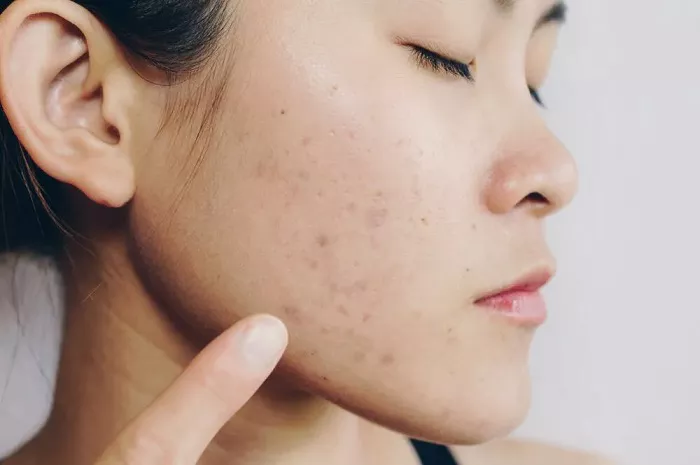Pimple Marks, those stubborn remnants of past breakouts, can be a source of frustration for many. We all seek effective remedies to bid adieu to these unwanted blemishes. One popular home remedy that has gained attention is the use of lemon to remove pimple marks. In this comprehensive article, we will delve into the science behind lemon’s potential as a remedy for pimple marks. We will explore its benefits, risks, and the right way to use lemon to tackle those persistent pimple marks.
The Science of Pimple Marks
Pimple Marks, also known as post-inflammatory hyperpigmentation (PIH), are the dark or discolored spots that linger after a pimple has healed. These marks result from an overproduction of melanin, the pigment responsible for skin color, triggered by inflammation. Understanding the science behind pimple marks is essential in assessing whether lemon can be an effective solution.
The Formation of Pimple Marks
Pimple marks form as a part of the skin’s natural healing process. When a pimple or acne breakout occurs, the skin’s defenses kick in to repair the damage. In the process, melanin can be produced in excessive amounts, leading to the appearance of dark spots or pimple marks.
Lemon and Pimple Marks: The Connection
Lemon, with its natural acidic properties and high vitamin C content, has been touted as a potential remedy for pimple marks. Let’s delve deeper into how lemon might help in reducing these marks and improving the overall complexion.
Lemon’s Exfoliating Properties
One of the key ways lemon aids in reducing pimple marks is through its exfoliating properties. The citric acid in lemon acts as a gentle exfoliant, helping to remove dead skin cells. This exfoliation can gradually lighten pimple marks and reveal fresher, more even-toned skin.
Vitamin C: A Skin Brightening Agent
Vitamin C, abundant in lemons, plays a pivotal role in skin health. It’s a powerful antioxidant that can help reduce oxidative stress on the skin, promoting a brighter complexion. When applied topically, vitamin C can target pimple marks, potentially lightening them over time.
Natural Bleaching Effect
Lemon is often considered a natural bleaching agent. This property has led some to believe that it can fade pimple marks by reducing their pigmentation. However, it’s essential to approach this aspect with caution to avoid potential side effects.
The Right Way to Use Lemon for Pimple Marks
While lemon may offer potential benefits for addressing pimple marks, it’s crucial to use it correctly to prevent adverse effects on the skin.
Dilution is Key
Lemon juice is highly acidic, which can be harsh on the skin if applied undiluted. To use lemon safely, mix it with an equal amount of water or a gentle moisturizer to create a milder solution.
Patch Test First
Before applying lemon juice to your entire face or affected areas, perform a patch test on a small, inconspicuous area of your skin. This step helps you determine if your skin can tolerate lemon without adverse reactions.
Sun Protection is a Must
Lemon can make your skin more sensitive to sunlight. Therefore, it’s imperative to apply sunscreen with adequate SPF when using lemon on your face to prevent further damage and darkening of pimple marks.
Consistency is Key
To see noticeable results, it’s essential to use lemon consistently. Incorporate it into your skincare routine, but avoid overusing it, as excessive acidity can irritate the skin.
Possible Side Effects and Risks
While lemon can be a natural remedy for pimple marks, it’s not without its risks and potential side effects.
Skin Irritation and Allergies
The high acidity of lemon can irritate sensitive skin, leading to redness, itching, or a burning sensation. Some individuals may even be allergic to citrus fruits, making lemon unsuitable for them.
Photosensitivity
As mentioned earlier, lemon makes the skin more sensitive to UV rays. Prolonged sun exposure without adequate protection can worsen pimple marks and cause further damage.
Dryness and Over-Exfoliation
Excessive use of lemon or leaving it on the skin for too long can lead to dryness and over-exfoliation, resulting in a compromised skin barrier.
Conclusion
Pimple marks can be a persistent issue for many, affecting self-esteem and confidence. While lemon does have potential benefits in reducing these marks, it should be used with caution and in conjunction with a well-rounded skincare routine. There is no one-size-fits-all solution, and results may vary from person to person. Consulting a dermatologist for personalized advice on addressing pimple marks is always a wise step. Remember, patience and consistency are key in the journey to achieving a clearer, blemish-free complexion.
[inline_related_posts title=”You Might Be Interested In” title_align=”left” style=”list” number=”6″ align=”none” ids=”2256,2276,2344″ by=”categories” orderby=”rand” order=”DESC” hide_thumb=”no” thumb_right=”no” views=”no” date=”yes” grid_columns=”2″ post_type=”” tax=””]


































